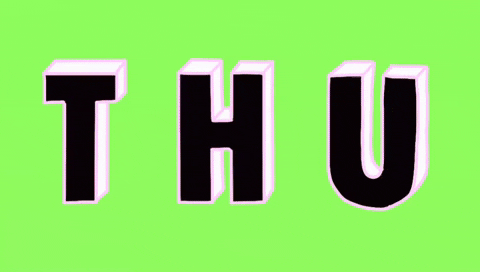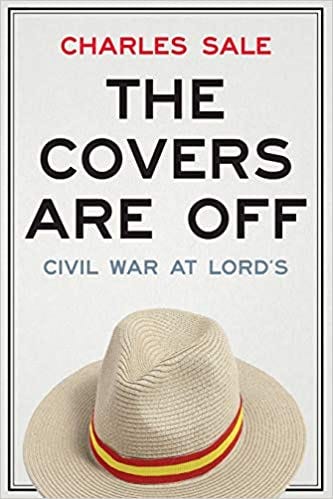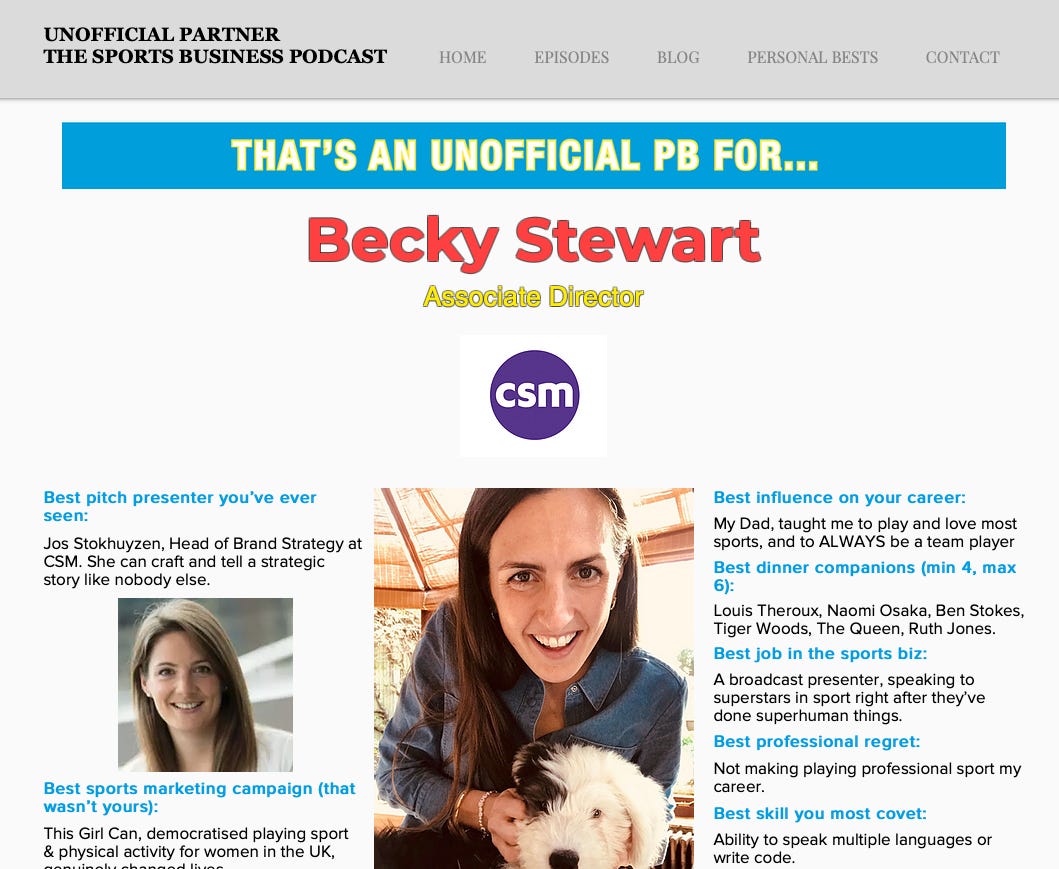That Osaka Moment; Lanyard hacks and phoney insiders; What would Charlie Sale do; Olympian prawns; Golf's back, panic over; Patrick Nally on Seb Coe; Does anyone know what turnkey means
The newsletter of the podcast
Golf’s numbers surge, panic over
For a sport that exudes institutional complacency, the news that golf courses are filling up is a mixed blessing.
What happened?
SMS did the survey for the R&A, which ran via the BBC.
An extra 2.3 million adults played in the UK and Ireland in 2020 despite disruption from the Covid-19 pandemic.
The numbers playing on a nine or 18-hole course in the UK increased by 2.1 million players to 5.2 million - the highest figure recorded this century.
Why do we care?
Something, something…mother of invention.
Golf has its share of restless innovators and the general sense of impending participatory doom gave them license to push radical change. Such as letting in women, kids and the BAME community.
Why, only this week Portmarnock rushed to repeal its men-only policy after 127 years. At this rate, they’ll have a Top Golf range by 2148.

The bit golf should activate around more often
Buried in the post-Covid boom headlines, was some data which a) feels true and b) is the key insight that would help sustain the interest of those who’ve come to the game recently.
Among avid/regular golfers, 31% had experienced some negative impact on their feelings of loneliness/isolation as a result of the pandemic. Of these, 79% believe playing golf had a positive impact.
Among lapsed/returning golfers, 44% had experienced some negative impact on their mental health as a result of the pandemic. Of these, 92% felt that playing golf had a positive impact.
Random Argument Generator: Osaka’s press conference
What happened?
Naomi Osaka, the world’s second-ranked female tennis player, pulled out of the French Open after refusing to take part in post-match media conferences, citing anxiety and depression.
Why do we care?
Osaka’s decision revealed the human fragility of the people behind the personal brands. And from the narrow sports biz perspective, every event uses press conferences as a promotional tool and to accrue sponsor media numbers. But players resent the intrusion and the Osaka moment might force a rethink of how the relationship evolves.
Who thinks what?
She’s a woke princess. A successful, black, liberal emotionally literate woman…can’t think why the right wing media have taken against her (this has some interesting background to the race question).
FWIW, I don’t think Venus Williams comments added much either. Her view is that the journalists are not worthy of asking her questions because they don’t play tennis as well as she does.
Martina Navratilova came from the ‘walk it off’ school:
‘It’s not a mental health issue, it’s a mental issue for a tennis player. She’s a four-time champion ... she’s a pro, you sign up for this.’
‘You just got to man up here: woman up, I should say.’
Unsurprisingly, the media has made this about them, using it to critique the presser as a form.
The best of these came from Jonathan Liew.
The great conceit of the press conference is that it is basically a direct line from the athlete to the public at large, that we humble scribes are but the people’s faithful eyes and ears in the land of the gods. In case you hadn’t noticed, this hasn’t really been true for a while. Athletes now have their own direct line to the public, and spoiler: it’s not us.
Where’s it going?
The athlete as publisher trend is beloved by the sports industry because they can control the message and make money from it. But I've never been convinced it’s that popular with the public, who see its obvious central flaw: the lack of objectivity.
The initial excitement around Player’s Tribune and others of its ilk has been helped by newspapers suffering a twenty year existential crisis. They have been willing to trade objectivity for access, turning first person quotes in to currency and proof of their insider credentials.
But this is just lanyard hackery, not journalism. Journalists are not supposed to be ‘insiders’. They are supposed to ask questions. Some of these will be difficult. Whether they should ask these of young women just after a physically and mentally exhausting match is another question entirely.
Good thread on this here:

What would Charlie Sale do?
Charlie Sale was adept at using press conferences to his own ends. (UP Pod #12 ‘At Home With Charlie Sale’)
He knew the answers to any question he asked in public would be copied and written up by everyone else in the room. So he’d sometimes ask an easy, obvious one, just to get things going.
But he’d save his best stuff for when the star turn, or their agent, were walking out the door, when he could get something extra.
Writing a daily column requires fresh material: private conversations, snippets, leads. Not quotes.
The press conference was just the start of the story, not the end of it.
And talking of Charlie Sale…
His new book is out. It’s a behind the scenes look at the business of Lord’s cricket ground and the people in charge are so worried about it they’ve banned it from their shop.
So the publisher lined the escalator at St John’s Wood station with ads.
This is how cricket fans were greeted on the morning of the first test against New Zealand this week.
Nice work. Hear Charlie talk about the new book on an upcoming podcast.
That IOC Hospitality story: making more cash from the TOPs and the long shadow of Pat Hickey
Short version:
What do we want? Better prawns.
When do we want them? From 2024 onwards.
What happened?
The IOC put a release out. I wouldn’t want to be tortured to reveal the meaning of the phrase: ‘Long term, turnkey solutions’.


A bit of context
Thomas Bach flagged an overhaul of Olympic hospitality in his Vision 2020+5 presentation.
There are two drivers. Cash and reputation.
Olympic hospitality has lagged behind other major rights holders, such as Fifa and F1.
Former Coke man Ricardo Fort knows his way around the corporate tent, and says it’s overdue.
This is very important for the Olympic partners that have been complaining for years about the challenges for offering hospitality solutions on site. There was an attempt to develop something like that in 2018 and the results were very positive. The IOC is fulfilling a promise to be made to the TOP partners years ago. I believe they found a good solution that will add value to everyone that come to the Games.
The FIFA model is very different because they have had MATCH Hospitality doing the onsite program / VIP suites for decades. In fact, the IOC was lagging behind when it comes to this area. FIFA/MATCH do a really good job. The IOC objective is to offer similar value to partners. The motivation is to create a new revenue stream for the Games.
The IOC’s TOP programme doubled in value over the course of the last two quadrennials. But about half the money goes on VIK services (think computer systems, official cars etc).
This reduces the cost of putting the Games on, but doesn’t release money to be sent to the NOCs that depend on it for their survival.
So, by using On Location to centralise the process, the IOC can make a land grab for the activation budgets that usually to agencies and other third parties.
The other bit is the optics. Think back to Rio 2016 and the Pat Hickey story revealed the dark market for Olympic hospitality, featuring the following words and phrases: IOC member. Underpants. A hotel room safe full of tickets. Dawn raid. Rio prison toilets.
Personal Best
Sports biz people list their favourite things
This week: Becky Stewart, associate director at CSM.
UP COMING: The Patrick Nally Diaries Part 3: Athletics turns pro, hilarity ensues.
In which our hero finds himself in a Crystal Palace car park with Bernie Ecclestone, creates the Golden Mile series, prepares for the inaugural World Athletics Championships in Helsinki, haggles with the notorious Andy Norman and discusses Seb Coe’s boot money. Oh, and the legacy of Dentsu’s relationship with World Athletics.
Episodes 1 (FIFA) and 2 (Olympics) of The Patrick Nally Diaries are available in the usual places.
Enjoy the Unofficial Partner newsletter? Tell your friends
Subscribe to the Unofficial Partner podcast.
Help us game the Substack algorithm by liking this newsletter and spread the word on social media.
Follow @RichardGillis1 and @PaulPingles (aka the ill-judged Twitter handle of Sean Singleton, the UP co-founder).
Read over 100 gushing five star reviews for UP on Apple Podcasts - click the link to add yours.










